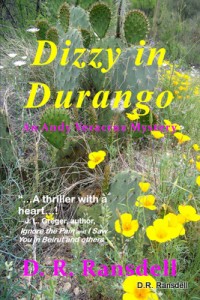After earning a degree to teach Spanish, D.R. Ransdell moved to Durango, Mexico. Her favorite Saturday nights were spent at house parties where guests fought over the guitar. When she returned to the U.S. five years later, she was so homesick for Mexico that she joined a mariachi band. Within weeks she had ideas for dozens of murder mysteries! She’s published six novels using some of those ideas, and has pieces in three of the Chicken Soup … series. Here’s her take on the difficult job of working humor into murder mysteries.
to Durango, Mexico. Her favorite Saturday nights were spent at house parties where guests fought over the guitar. When she returned to the U.S. five years later, she was so homesick for Mexico that she joined a mariachi band. Within weeks she had ideas for dozens of murder mysteries! She’s published six novels using some of those ideas, and has pieces in three of the Chicken Soup … series. Here’s her take on the difficult job of working humor into murder mysteries.
The funny thing about murder is that it really shouldn’t be funny. Oh, it’s swell to kill off the bad guy when it’s a bad boss, bad relative, bad neighbor, bad lover, etc., etc., but for a mystery to pull any emotional weight, there needs to be an undeserving victim. Some kind of right should be wronged, but since there’s a price to be paid, the story shouldn’t actually be funny, right?
When a friend reviewed a draft of my latest mystery, he questioned me on this topic. “The ending is awfully dark,” he said. “Are you sure that’s what your readers want?” I went back to see if I could change the final paragraphs. I understood my friend’s comment—yes, the ending put a damper on things. The heroine didn’t quite get what she wanted. She wound up more pensive and confused at the end than at the beginning—in some ways she hadn’t made much progress. But she’d also lost someone dear to her. She needed a way to deal with that, didn’t she?
I’ve come across this conundrum in my writing a couple of times. While I like using humor in my mystery series—my protagonist, a male mariachi violinist, does make lots of mistakes that get him into trouble with friends and loved ones—so far the endings have all been gray.
For a while I kept trying to figure out why I couldn’t reconcile the desire to be light-hearted and entertaining with my characters’ reactions to the deaths of their friends and acquaintances.
The useful writing guide Story Trumps Structure by Steven James helped me analyze this issue. James explains that cozy readers want something safe and fun. They’re looking for a light-hearted puzzle. That’s well and good, but there’s a catch: “This genre presents a difficult balance of trying to care for your readers’ expectations while not diminishing the value of human life—a challenge for even the most gifted authors.” (In Chapter 4, “Escalation.”)
James is quite right. The cozy—or any humorous mystery—is tricky. You want your protagonists to care, but you don’t want them to fall apart to the point that they can’t function; after all, they might have to get back out there and save the day. But James’ observation does point to a dilemma. Do I want to simply provide my readers with an enjoyable read, or do I want them to think about moral dilemmas?
In the Andy Veracruz series, I want to provide readers with insight about music or give musicians the chance to ponder familiar situations. I’ve been toying with an idea for a new murder mystery series that would take place in Italy and focus on culture/language/travel. In both cases, I certainly want readers to laugh. I want them to keep reading and be thoroughly entertained. The appropriate level of humor, however, is yet to be determined.
In the meantime, I’ll continue to collect ideas for future murder mysteries. Cozy or not, there are still plenty of people out there who deserve the best fictional death I can muster for them. While I don’t want to let my protagonists off the emotional hook, I’ll try to include some comic relief. Humor is a valuable tool in our daily lives, so we need to embrace it. After all, who hasn’t told a few jokes at a funeral parlor?
What are your own views about the use of humor in mystery? If you’re a writer, how do you deal with the situation yourself? If you’re a reader, what do you prefer?
JIM: Thanks D.R. for some food for thought. I hope some of our readers will leave their thoughts on humor in a murder mystery.
 Her latest release is Dizzy in Durango (funny, but not too funny!) Missing women, abandoned children, and a crazy mariachi fan add up to further trouble for Andy Veracruz. Soon he’s stuck with an angry would-be girlfriend and a self-appointed younger brother who is more reckless than he is. No wonder he feels dizzy!
Her latest release is Dizzy in Durango (funny, but not too funny!) Missing women, abandoned children, and a crazy mariachi fan add up to further trouble for Andy Veracruz. Soon he’s stuck with an angry would-be girlfriend and a self-appointed younger brother who is more reckless than he is. No wonder he feels dizzy!
Take a look at: http://mybook.to/dizzyindurango
And give us your thoughts on this conundrum. Thanks.

You have brought up a very good point re death and humour! I am wrestling with it as well — but haven’t mastered it the way you have. Your characters have to experience some state of grief, depending on their relation with the victim. I guess that’s why it’s easiest to write from the perspective of detectives or other detached main characters. But, as you say, humour can also lighten a serious load, and many of us have been to funerals and have grieved where there is a lot of laughing.
Kate, I wouldn’t say I’ve mastered it! But it is an intriguing thing to consider and wrestle with. In some ways I guess the situation is lifelike–funny things and horrible things often happen at the same time, and we have to hold onto the humor as much as we can!
Inserting humor into a murder mystery is always tricky, I agree, yet I love humor in my mysteries, love to read it, love to write it. I also want some serious themes in my reading which I believe cozy mysteries can do, especially themes that impact everyday lives. Jim Callan’s work and that of D. R. Ransdell epitomize the best of the cozy mystery with serious themes.
Lesley, I so agree. You want your mystery to be about something, and you want readers to learn something. Curiously enough, one friend who read the book thought I needed more political commentary–needed to do more to highlight some of the social problems in Mexico. I don’t feel that’s quite my job either–but I did want to point to some obvious problems that I have dealt with–or rather watched friends deal with–in real life.
D.R., I think a mystery should make some serious, important statement about some aspect of the human condition. But a mystery must also entertain. Comic relief is a wonderful tool. It worked for Shakespeare, after all. Fine post!
Thanks, John! I think it’s hard to get the right balance–you want things to count, yet it IS fiction, so you can’t take it too seriously either! I guess I think about a novel/film like Get Shorty–I think Elmore got it perfectly in that one!
Thank you for your thoughts about humor in a murder mystery. I have to sometimes go back during my editing phases to add some humorous scenes, usually involving the cat in my series. Like you said, a murder is a somber situation, and some cozies tend to speed along with glib, unlikely scenes, oblivious to the sad fact that someone died unjustly. My opinion is that there needs to be some substance to make a read worthwhile. I love to learn more about current issues, human values, and, yes, culture/language/travel while I enjoy a fun mystery.
Thanks, Joyce! I can understand the problem of having to go back and add humor. When we’re writing, we get really caught up in things–sometimes to the extent of forgetting about the readers–whoops! Sometimes I have the opposite problem–Andy has funny things happen to him–he can’t help it. But then all of a sudden he’s in the midst of something bigger than he is!
Even noir gets to be funny, albeit very wry and dry funny, because, I believe, the worst situations require the most comic relief. And not just in fiction, either. I’m excited to check out Story Trumps Structure. Thank you for that tip!
True, we really do need comic relief! And some of the best noir has great humor.